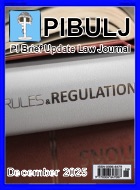Legal Mind Case and Commentary No 42: Expert Impartiality: Compliance - Koch, H.C.H., Jansen, F., Ma, S.Y.A., Aldridge, M. and Nokling, K. E. (April 2023)

Court-instructed discussions between experts are getting more frequent, reflecting that they are held in high regard as a method for clarifying expert opinions and, their similarity and differences. They reduce court time, limit legal costs and encourage settlement between parties (Bond Solon, 2023).
A recent Q&A conducted by Bond Solon raised several issues which are well worth reiterating in this short Legal Case and Commentary, even though they do not refer to a specific case. Before debating these several issues, it is worth noting that Part 35 of the CPR clearly states that:
1) It is the duty of the expert to help the Court on matters within their expertise,
2) Their duty overrides any obligation to the person from whom experts have received instructions or by whom they are paid.
These issues include:
1) Reason for Court Direction: the aim of the ‘Joint Statement’ is to clarify for the Court what the areas of agreement are and also to set out any areas of disagreement. It is thought that the experts concerned are in the best place logically to produce this summary and clarification. The aim is not to ‘win’ the argument between the two experts.
2) Joint statement areas of difficulty: typically, difficulties can arise if there are personality clashes between the two experts, lack of experience in either or both experts in carrying out a joint statement, or a bias in one expert for promoting his instructing party’s case. Extreme and unresolvable clashes are rare however.
3) Dealing with a ‘difficult’ opponent: as stated in the preceding paragraph, limited experience and difficult communication skills can result in one expert coming across as ‘difficult’ or ‘obstructive’. The joint statement process is a logical and very effective process utilising skills of logicality and rational evidential conflict resolution, with the overriding purpose of producing a joint statement. Ultimately, any disagreement can be clearly stated for the Court to understand.
4) Role of instructing solicitor: the instructing parties can provide an agenda (or two) of key issues for the experts to address in their discussions but should not take any part in the discussions or shout not influence this process.
5) Difficult aspects of joint statement discussion: ‘point scoring’ between experts and attempts to ‘brow-beat’ the other expert should not occur. Typically these days, both experts will be experienced, sensible, logical and committed to achieving the objective of the joint statement discussion, namely a concise joint statement which helps the Court understand the position and opinion of each expert.
Key micro-skills for joint statement competition are shown in figure 1. below:

Conclusion
The Bond Solon Q&A provided excellent summary information about key aspects of the joint statement process. Clear understanding of these practical issues reinforces the importance of the joint statement process to the Court and the efficiency and effectiveness of litigation.
Authors
Prof. Hugh Koch, Dr. Mari Aldridge and Dr. Kirsten Elaine Nokling are all members of HK Associates.
Professor Koch is visiting professor in Law and Psychology at Birmingham City University.
Dr Friso Jansen, Senior Lecturer in Law at Birmingham City University.
Dr Siu Yung Alan Ma, Lecturer in Law at Birmingham City University.
References
Bond Solon (2023). Discussion between experts – is it worth the time. www.bondsolon.com
Koch, H.C.H., Jansen, F., Ma, S.Y.A., Hughes, R. and Proctor, B. (2023). Legal Mind Case and Commentary No. 41 Expert Witness Requirements. PIBULJ. February, 2023
Koch, H.C.H., Jansen, F., Maisey, D. and Natha, F. (2022). Legal Mind Case and Commentary No. 40 Expert witnesses, beware unconscious bias. PIBULJ. November, 2022.
Koch, H.C.H., Jansen, F., Potts, M. and Browne, G. (2022). Legal Mind Case and Commentary No. 39 “Keep the Joint Statement Concise and Logical”. PIBULJ. September, 2022.
Koch, H.C.H, Jansen, F., Grundy, L. and Robertson, C. (2022). Legal Mind Case and Commentary No. 38 The Importance of being an independent expert. PIBULJ. August, 2022.
Image ©iStockphoto.com/mediaphotos












![Appeal judge rules that credit hire company has no costs liability following a finding of fundamental dishonesty in personal injury case: RSA v. Fastrack Solutions Limited [2023] 4 WLUK 92 - David Bowden, Erimus Chambers](/content/images/resized/images/stories/carkeys_72_72.jpg)


